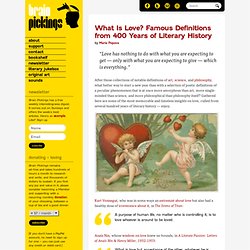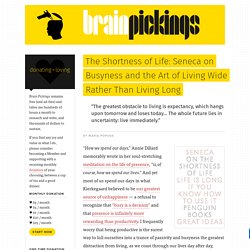

The Two Kinds of Equality. The above video is part of a series created by The North Wire.

Most people would say they believe in equality, but what does equality really mean? Does it mean that the law should apply equally to everyone? Or does it mean that everyone should be equal in outcome? To tell someone they're wrong, first tell them how they're right — Quartz. The 17th century philosopher Blaise Pascal is perhaps best known for Pascal’s Wager which, in the first formal use of decision theory, argued that believing in God is the most pragmatic decision.

But it seems the French thinker also had a knack for psychology. As Brain Pickings points out, Pascal set out the most effective way to get someone to change their mind, centuries before experimental psychologists began to formally study persuasion: 35 Incredible Tim Berners-Lee Quotes. Sir Tim Berners-Lee is an English computer scientist and is also known as the inventor of the World Wide Web.

As the founder and director of the World Wide Consortium (W3C), he oversees the mission, freedom, and openness of the Web. Here is a collection to some of the most incredible Tim Berners-Lee quotes from his life. “Any enterprise CEO really ought to be able to ask a question that involves connecting data across the organization, be able to run a company effectively, and especially to be able to respond to unexpected events. Most organizations are missing this ability to connect all the data together.” 18 Greatest Robert Hooke Quotes. Robert Hooke was an English philosopher, architect, and polymath.

Epistemology. A branch of philosophy concerned with the nature and scope of knowledge Epistemology (; from Greek ἐπιστήμη, epistēmē, meaning 'knowledge', and -logy) is the branch of philosophy concerned with the theory of knowledge.

Epistemology is the study of the nature of knowledge, justification, and the rationality of belief. Much debate in epistemology centers on four areas: (1) the philosophical analysis of the nature of knowledge and how it relates to such concepts as truth, belief, and justification,[1][2] (2) various problems of skepticism, (3) the sources and scope of knowledge and justified belief, and (4) the criteria for knowledge and justification. Epistemology addresses such questions as: "What makes justified beliefs justified? ",[3] "What does it mean to say that we know something? " Etymology[edit] What Is Love? Famous Definitions from 400 Years of Literary History. By Maria Popova “Love has nothing to do with what you are expecting to get — only with what you are expecting to give — which is everything.”

After those collections of notable definitions of art, science, and philosophy, what better way to start a new year than with a selection of poetic definitions of a peculiar phenomenon that is at once more amorphous than art, more single-minded than science, and more philosophical than philosophy itself? Gathered here are some of the most memorable and timeless insights on love, culled from several hundred years of literary history — enjoy. Kurt Vonnegut, who was in some ways an extremist about love but also had a healthy dose of irreverence about it, in The Sirens of Titan: A purpose of human life, no matter who is controlling it, is to love whoever is around to be loved. Anaïs Nin, whose wisdom on love knew no bounds, in A Literate Passion: Letters of Anaïs Nin & Henry Miller, 1932-1953: Carl Sagan on Science and Spirituality. An Antidote to the Age of Anxiety: Alan Watts on Happiness and How to Live with Presence.
By Maria Popova Wisdom on overcoming the greatest human frustration from the pioneer of Eastern philosophy in the West.

“How we spend our days is, of course, how we spend our lives,” Annie Dillard wrote in her timeless reflection on presence over productivity — a timely antidote to the central anxiety of our productivity-obsessed age. 20-Year-Old Hunter S. Thompson’s Superb Advice on How to Find Your Purpose and Live a Meaningful Life. As a hopeless lover of both letters and famous advice, I was delighted to discover a letter 20-year-old Hunter S.

Thompson — gonzo journalism godfather, pundit of media politics, dark philosopher — penned to his friend Hume Logan in 1958. Found in Letters of Note: Correspondence Deserving of a Wider Audience (public library | IndieBound) — the aptly titled, superb collection based on Shaun Usher’s indispensable website of the same name — the letter is an exquisite addition to luminaries’ reflections on the meaning of life, speaking to what it really means to find your purpose. Cautious that “all advice can only be a product of the man who gives it” — a caveat other literary legends have stressed with varying degrees of irreverence — Thompson begins with a necessary disclaimer about the very notion of advice-giving: Susan Cain on the Power of Introverts, Live-Illustrated by Molly Crabapple. How to Be Alone: An Antidote to One of the Central Anxieties and Greatest Paradoxes of Our Time.
By Maria Popova “We live in a society which sees high self-esteem as a proof of well-being, but we do not want to be intimate with this admirable and desirable person.” The Shortness of Life: Seneca on Busyness and the Art of Living Wide Rather Than Living Long. “How we spend our days,” Annie Dillard memorably wrote in her soul-stretching meditation on the life of presence, “is, of course, how we spend our lives.”

And yet most of us spend our days in what Kierkegaard believed to be our greatest source of unhappiness — a refusal to recognize that “busy is a decision” and that presence is infinitely more rewarding than productivity. I frequently worry that being productive is the surest way to lull ourselves into a trance of passivity and busyness the greatest distraction from living, as we coast through our lives day after day, showing up for our obligations but being absent from our selves, mistaking the doing for the being. Despite a steadily swelling human life expectancy, these concerns seem more urgent than ever — and yet they are hardly unique to our age.
How to Live: Lessons from Montaigne, Godfather of Blogging. By Maria Popova Don’t worry about death, pay attention, read a lot, give up control, embrace imperfection.

“Living has yet to be generally recognized as one of the arts,” Karl De Schweinitz wrote in his 1924 guide to the art of living. Stanford Encyclopedia of Philosophy. Internet Encyclopedia of Philosophy. Philosophy of religion. Philosophy of religion is a branch of philosophy concerned with questions regarding religion, including the nature and existence of God, the examination of religious experience, analysis of religious vocabulary and texts, and the relationship of religion and science.[1] It is an ancient discipline, being found in the earliest known manuscripts concerning philosophy, and relates to many other branches of philosophy and general thought, including metaphysics, logic, and history.[2] Philosophy of religion is frequently discussed outside of academia through popular books and debates, mostly regarding the existence of God and problem of evil.
The philosophy of religion differs from religious philosophy in that it seeks to discuss questions regarding the nature of religion as a whole, rather than examining the problems brought forth by a particular belief system. It is designed such that it can be carried out dispassionately by those who identify as believers or non-believers.[3] [edit] Perennial philosophy. The Perennial philosophy (Latin: philosophia perennis), [note 1] also referred to as Perennialism, is a perspective in the philosophy of religion which views each of the world’s religious traditions as sharing a single, universal truth on which the foundation of all religious knowledge and doctrine has grown.
Agostino Steuco (1497–1548) coined the term philosophia perennis,[1] drawing on the neo-Platonic philosophy of Marsilio Ficino (1433–1499) and Giovanni Pico della Mirandola (1463–94). In the early 19th century this idea was popularised by the Transcendentalists. A good question - my attempt in answering it. The Thoughts of the Emperor Marcus Aurelius Antoninus.
Baruch Spinoza. 1. Biography Bento (in Hebrew, Baruch; in Latin, Benedictus: all three names mean "blessed") Spinoza was born in 1632 in Amsterdam. He was the middle son in a prominent family of moderate means in Amsterdam's Portuguese-Jewish community. As a boy he had undoubtedly been one of the star pupils in the congregation's Talmud Torah school. He was intellectually gifted, and this could not have gone unremarked by the congregation's rabbis. And then, on July 27, 1656, Spinoza was issued the harshest writ of herem, or excommunication, ever pronounced by the Sephardic community of Amsterdam; it was never rescinded. To all appearances, Spinoza was content finally to have an excuse for departing from the community and leaving Judaism behind; his faith and religious commitment were, by this point, gone. 2.
The Ethics is an ambitious and multifaceted work. 2.1 God or Nature. Reason. Psychologists and cognitive scientists have attempted to study and explain how people reason, e.g. which cognitive and neural processes are engaged, and how cultural factors affect the inferences that people draw. The field of automated reasoning studies how reasoning may or may not be modeled computationally. Animal psychology considers the question of whether animals other than humans can reason. Etymology and related words[edit] In the English language and other modern European languages, "reason", and related words, represent words which have always been used to translate Latin and classical Greek terms in the sense of their philosophical usage. The original Greek term was "λόγος" logos, the root of the modern English word "logic" but also a word which could mean for example "speech" or "explanation" or an "account" (of money handled).[7]As a philosophical term logos was translated in its non-linguistic senses in Latin as ratio.
Philosophical history[edit] Classical philosophy[edit] To Live at All is Miracle Enough. I read Richard Dawkins book ‘Unweaving the Rainbow’ a little while ago and there was a part that really brought me up short with one of those ‘WOW’ moments. It really brings home the sheer unliklihood and odds against any of us actually being born and being able to experience and enjoy this only too brief sojourn on earth. I have been thinking about it quite a bit lately and really wanted to reread it again. Belief. Top 100 Western Philosophers: from Ancient to Contemporary Philosophers. This article shows the top 100 most important philosophers in the Western civilization from the ancient Greek classics such As Socrates, Plato and Aristotle’s to contemporary philosophers such as Levi-Strauss and Foucault, passing by great masters such as Descartes or Spinoza.